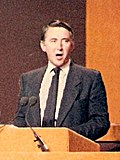3 May 1977 (Scotland) 5 May 1977 (England & Wales) 18 May 1977 (Northern Ireland) | |||||||||||||||||||||||||||||
1 Unicameral area, all 6 metropolitan counties, all 39 non-metropolitan counties, 1 sui generis authority, all 26 Northern Irish districts, all 53 Scottish districts and all 8 Welsh counties | |||||||||||||||||||||||||||||
|---|---|---|---|---|---|---|---|---|---|---|---|---|---|---|---|---|---|---|---|---|---|---|---|---|---|---|---|---|---|
| |||||||||||||||||||||||||||||
 Colours denote the winning party, as shown in the main table of results. | |||||||||||||||||||||||||||||
Local elections were held in the United Kingdom in May 1977. The results were a major mid-term setback for the Labour government, and the Conservatives, the main opposition, comprehensively regained control of the Greater London Council with 64 seats against Labour's 28. Elections were also held in the county councils and in Northern Ireland. [1] [2]
Contents
- England
- Unicameral area
- Metropolitan county councils
- Non-metropolitan county councils
- Sui generis
- Northern Ireland
- Scotland
- District councils
- Wales
- County councils
- References
The Conservative Party gained 1,293 seats, bringing their number of councillors to 12,370. The Labour Party lost 1,098 seats, leaving them with 7,115 councillors. The Liberal Party lost 163 seats, leaving them with 950 councillors.
Changes were as follows:
- Conservative gain from no overall control - Bedfordshire, Cambridgeshire, Cumbria, Gloucestershire, Hampshire, Hertfordshire, Leicestershire, Lincolnshire, Norfolk, Warwickshire, Wiltshire, Worcestershire
- Conservative gain from Labour - Derbyshire, Northamptonshire, Nottinghamshire, Staffordshire
- Conservative gain from Independent - Isle of Wight


